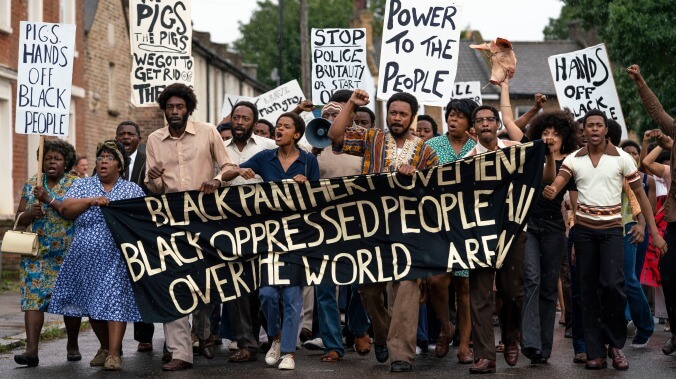Steve McQueen’s Small Axe anthology begins with the essential, galvanizing Mangrove


For 24 years, The Mangrove, owned by late activist Frank Crichlow, served as a humble haven for Notting Hill, London’s robust West Indian community. Throughout its life, the café would ultimately double as a meeting place for artists and community organizers while maintaining a small list of famous clientele like Bob Marley, Jimi Hendrix, and Nina Simone. It was a place for some of the region’s most brilliant minds to congregate. Primarily, however, it was a restaurant that served the cuisine that centered on and nourished the Black immigrant community. Between January 1969 and July 1970, the police raided The Mangrove 12 times, and the resulting landmark court case would signal a vital turn in British-Caribbean history. Despite its importance, the story of the Mangrove Nine has largely evaded a cinematic retelling of Mangrove’s magnitude.
A story like the one that pilots Mangrove is something that could have easily devolved into awards season fodder, a half-hearted play for “timely” content (a cursed phrase in this context, as any insinuation that insidious racism is somehow limited to a product of the moment is laughable) in the midst of an already cooling global reckoning with systemic racism. In Steve McQueen’s hands, Frank Crichlow’s (Shaun Parkes) journey is handled with appropriate complexity, specificity, and care, as this Small Axe starter avoids toothless reverence and inspiration porn in favor of a story that feels both real and familiar to those who understand this brand of strife intimately. As McQueen and this stellar cast demonstrate, the trial of the Mangrove Nine aligns with an experience shared by Black citizens across the diaspora. More importantly, it’s an integral part of British history and a story that should be considered exclusively from the perspectives of the people most affected by the deeply entrenched racism at its core.
Aside from its bevy of noteworthy performances, Mangrove’s most impressive quality stems from the ways McQueen carefully maps the tumultuous road that leads to it stirring courtroom climax. Each detail bolsters the heartbreaking senselessness of the matter, from the mellifluous celebration of the Mangrove’s patrons underneath the icy, watchful glowers of predatory police officers PC Pulley (Sam Spruell) and Dixon (Joseph Quinn), to the repetition of the many raids that ravage the small café over time. Lingering, uncomfortable shots of a ransacked kitchen just after a particularly raucous police raid drive home the whirlwind nature of these violent power dynamics, continuing McQueen’s penchant for resonant camera work. (Much like the single shot of the limo ride through segregated Chicago in his 2018 heist adventure, Widows, the long look at the colander crashing to the tile while the audience quietly sits with the violent behavior of the police makes a serious impression.)
As the police wield brutal tactics in an attempt to stifle the lively Caribbean community, a burgeoning revolution rips through the London streets, resulting in protests and a wave of support for The Mangrove, courtesy of, in large part, the Black Panthers. While it heralds the fiery spirit of men like Frank and Darcus Howe (the latter played magnificently by Malachi Kirby), Mangrove is intentional in its mission to credit the women of the movement in a way that is often reserved for men. As leader Altheia Jones-LeCointe, Letitia Wright stuns with a performance that spans the emotional spectrum, commanding our focus and respect with the prowess of a seasoned leading woman. Her passion is matched by that of Rochenda Sandall’s Barbara Beese, who, barring a few moments that border on caricature, ushers in the unmistakable energy of a revolutionary and the underlying anxiety of a mother and partner.
When the Mangrove Nine are arrested and must face trial, each figure is tasked with juggling both the clear benefits of revolution (systemic change, peace) with the real-life ramifications of an unjust system (possible separation from one’s family, continued state-sanctioned violence and harassment, death). Frank is an especially conflicted, flawed hero. Against Altheia’s relentless pursuit of justice, Frank is passionate but reluctant in comparison. While the late Crichlow’s legacy ultimately paints the picture of a proven activist, McQueen and Parkes are careful to lean on his flaws and humanize Frank. An explosive scene between Frank and Altheia pits opposing approaches to freedom against one another: Where Altheia is ready to fight ardently, Frank considers a plea deal in the face of what seems like hopeless adversity. Parkes and Wright make a formidable duo, each matching their scene partner’s verve beat for beat while underscoring the seriously complex nature of activism.
Ultimately, their shared fight against corruption plays out in a sequence of courtroom scenes that sets the stage for some profound performances from the entire ensemble. The Mangrove Nine are largely left to fend for themselves as they face an inherently racist legal system as their own representation. Kirby masterfully blends anger, hope, desperation, and resolve to shape unforgettable moments of self-advocacy in the face of oppression during a succinct cross-examination between Darcus and PC Pulley and heart-clenching but dignified appeals to the jury. These moments serve as vehicles for Kirby’s powerful delivery and the sharp dialogue by McQueen and co-writer Alastair Siddons.
Although the story of the Mangrove Nine is one that is only just seeing its rightful cinematic retelling, it is one of the most vital milestones in the long-storied relationship between Black people and the justice system, as it is the first time in Britain’s history that a court formally recognized bias within the police force. Mangrove will likely be lauded for its universal relatability (as it should), but the heart of this tale beats with specifics: This is a distinctly British story about Britain’s history with anti-Blackness. Furthermore, it’s a triumphant moment of rebellion and overdue justice that sets an appropriately high bar for the rest of the Small Axe anthology.